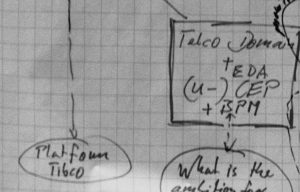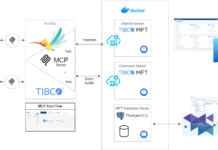 I can’t say I’m a huge fan of the term “edBPM” as all managed business processes rely on events – it’s a bit like saying “flexible agile development”… However the goal is worthy enough, as it is to convey the use of event processing technology in automated business processes. For this reason I am also not a fan of the “Management” part in “edBPM” – pureplay BPM systems like TIBCO AMX BPM provide management of (human-oriented) business processes, whilst automated business processes have different, simpler, “management” needs. A more accurate term might be CEP-based Business Processing, using things like inference-driven business processes with integrated decisioning and business monitoring… but this begs the question “how is this different from complex event processing” with an emphasis on the “processing”, not merely the detection of “complex events”.
I can’t say I’m a huge fan of the term “edBPM” as all managed business processes rely on events – it’s a bit like saying “flexible agile development”… However the goal is worthy enough, as it is to convey the use of event processing technology in automated business processes. For this reason I am also not a fan of the “Management” part in “edBPM” – pureplay BPM systems like TIBCO AMX BPM provide management of (human-oriented) business processes, whilst automated business processes have different, simpler, “management” needs. A more accurate term might be CEP-based Business Processing, using things like inference-driven business processes with integrated decisioning and business monitoring… but this begs the question “how is this different from complex event processing” with an emphasis on the “processing”, not merely the detection of “complex events”.
This week Rainer von Ammon hosted edBPM2010 as a workshop at the ServiceWave2010 conference, which had the theme of Ubiquitous CEP or U-CEP. This was attended by representatives from a variety of institutions, from a large European telco to a Chinese University. And the variety of interests around U-CEP was fascinating – brain systems, socio-economic organisations and the like – all of which seemed far more interesting than a computer scientist might initially imagine. The “discussion table” I attended focussed on CEP in manufacturing for which the STM use case is an excellent example, and for which the German University of Siegen team described their work with a specialist metal foundry (constructing, for example, aluminium engine blocks for exclusive executive cars). An interesting point here was the fact that German heavy industry was investing in CEP research to remain competitive in a global economy.
Last week was another angle for CEP-based Business Processing – the OMG standards body voted to extend the “Letter Of Interest” in, and hence allow new submitters for, the proposed CMPM (Case Management Process Modelling) standard. At the beginning of this standard TIBCO had presented its plan-based, rule-driven Advanced Fulfillment Framework (AFF, now TIBCO ActiveFulfillment and ActiveCatalog) as a response to an RFI on Dynamic Business Activity Modelling. The increasing current interest in case management and “Adaptive Case Management” is part of the same swell in interest in edBPM / CEP-based Business Processing.
Now, vendors are not really allowed to create pervasive technology acronyms (as competitors naturally insist on inventing competing terms). This is a job best left for the industry analysts (or possibly bodies like EPTS). So far I have not seen much interest from them in the term “edBPM”. And “Complex Event based Business Processing” is probably too close to “CEP” – in more senses than just the words – so “CEBP” is probably not going to fly either. Other related / overlapping / equivalent terms to edBPM have included dynamic BPM and knowledge-driven process modelling, and probably a few others. We shall see what term or terms eventually “stick” for this concept – watch this space!





